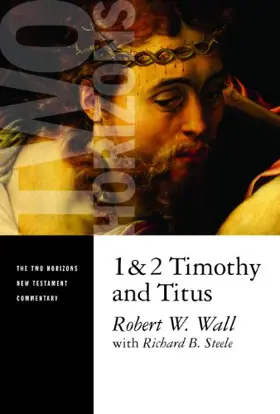

1 and 2 Timothy and Titus
in Two Horizons New Testament Commentary
Pages
392
Publisher
Eerdmans
Published
2012
ISBN-13
9780802825629
If Paul didn't write the Pastoral Epistles, how can we preach from them -- and why should we? The academy's queries about the authorship of the Pastorals have had a deleterious result in the academy, Robert Wall believes, with a trickle-down effect among the church's clergy who rarely teach or preach from these letters.
In this paragraph-by-paragraph theological commentary on 1 and 2 Timothy and Titus Wall powerfully demonstrates the ongoing relevance and authority of these canonical epistles for the church today. Uniquely, Wall applies a "Rule of Faith" methodology -- five core beliefs articulated in Tertullian's Prescription Against Heretics -- for interpreting the texts as sacred Scripture. Also, interspersed throughout the commentary are case studies, stories of prominent Christian leaders and faith communities that vividly instantiate key themes of the Pastorals. Wall's innovative yet reverent approach will revive the interest of students, pastors, and other Christian leaders in the Pastoral Epistles.
In this paragraph-by-paragraph theological commentary on 1 and 2 Timothy and Titus Wall powerfully demonstrates the ongoing relevance and authority of these canonical epistles for the church today. Uniquely, Wall applies a "Rule of Faith" methodology -- five core beliefs articulated in Tertullian's Prescription Against Heretics -- for interpreting the texts as sacred Scripture. Also, interspersed throughout the commentary are case studies, stories of prominent Christian leaders and faith communities that vividly instantiate key themes of the Pastorals. Wall's innovative yet reverent approach will revive the interest of students, pastors, and other Christian leaders in the Pastoral Epistles.
Reviews
Wall, who is well known for his “canonical” reading of Scripture, is responsible for the theological exposition of the Pastorals in the commentary. Steele, a historical theologian, adds insightful case studies in the interpretation of these texts.
[Full Review]
Wall's "Rule of Faith" approach helps avoid some of the common trends in commentaries on the Pastorals- spending huge amounts of space defending or refuting Pauline authorship. He certainly doesn't ignore those questions, but allows them to be noted and then move on to what the text offers as received Scripture. This creates some problems of its own in order to avoid other problems. But overall, it's a good theological commentary, though the case studies- interesting as they may be- feel a bit out of place.

